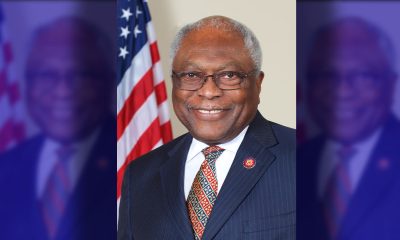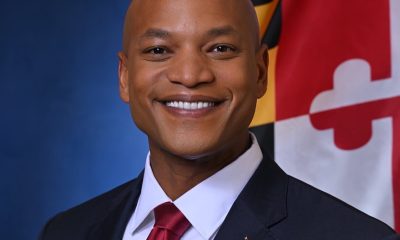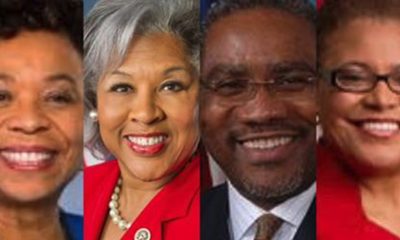World
Thousands Protest Woman’s Mob Killing in Afghan Capital

Afghan women, demand justice for a woman who was beaten to death by a mob after being falsely accused of burning a Quran last week, during a protest in downtown Kabul, Afghanistan, Tuesday, March 24, 2015. Men and women of all ages carried banners bearing the bloodied face of Farkhunda, a 27-year-old religious scholar killed last week by a mob. Farkhunda, who went by one name like many Afghans, was beaten, run over with a car and burned before her body was thrown into the Kabul River. The poster at center with Persian writing reads, “Farkhunda’s murderers, execution.” (AP Photo/Massoud Hossaini)
LYNNE O’DONNELL, Associated Press
KABUL, Afghanistan (AP) — Thousands marched through the Afghan capital Tuesday, demanding justice for a woman who was beaten to death by a mob after being falsely accused of burning a Quran.
Men and women of all ages carried banners bearing the bloodied face of Farkhunda, a 27-year-old religious scholar killed last week by the mob. Farkhunda, who went by one name like many Afghans, was beaten, run over with a car and burned before her body was thrown into the Kabul River.
Organizers of Tuesday’s march — the second protest over the brutal slaying in as many days — estimated that up to 3,000 people took part, calling it one of the biggest demonstrations in Kabul’s history. Marchers chanted “Justice for Farkhunda!” and “Death to the killers!”
Amrullah Saleh, a political leader and former director of the intelligence service, the National Directorate of Security, said the demonstrators sought to make Farkhanda an icon of the struggle against “injustice, mob court, street violence, violence against women, lawlessness, extremism” and, especially the injustice suffered by women.
“She is an example of probably what has happened silently to many,” Saleh told The Associated Press. “She drew a line with her blood between those who want justice, rule of law, and those who are extreme in their views and who breed in lawlessness”
The Interior Ministry said 28 people have been arrested and 13 police officers suspended as part of investigations. Also, the spokesman for the Kabul police, Hashmat Stanikzai, was fired over comments he made on social media supporting Farkhunda’s killers. Stanikzai could not be immediately reached for comment.
The Taliban issued a statement on Tuesday, condemning the attack and calling it a conspiracy that uses “the name of the Quran to kill innocent civilians.” It also extended condolences to Farkhunda’s family.
The demonstrators in Kabul also called for action against officials and religious leaders who had initially said that Farkhunda’s killing was justifiable if she had burned pages of a Quran, the Muslim holy book.
Among the crowd were prominent rights activists, including Fatana Gailani, the head of the Afghanistan Women’s Council, who said she hoped the incident would be a catalyst for change in a society traumatized by war, corruption and lack of leadership.
“The new generation has known nothing but war, they are not educated,” she said.
President Ashraf Ghani took office in September following a bitter election campaign during which he promised to champion women’s constitutional rights, end corruption and bring peace. Six months into his presidency, his Cabinet is not yet complete, economic growth is stalled after double digits in 2013, and the fight against the Taliban is in full force despite his efforts to open a dialogue with the insurgents.
Ghani’s wife and First Lady Rula, a Christian of Lebanese background, has pushed for women’s rights but has not yet spoken publicly about Farkhunda’s killing — though she is believed to have visited the woman’s family briefly before her funeral on Sunday.
Despite constitutional guarantees of equality and protection from violence, women in Afghanistan are still widely subject to violence, both privately and publicly.
Some activists say the killing has brought cohesion to civil society and unity to Afghans, appalled by the brutality of the attack.
In Kabul’s industrial suburb of Kotesangi, 33-year-old carpet seller Abdul Hamid said Farkhunda’s death has shattered the dignity of the Afghan nation.
“Everybody has a sister,” he said. “I’ve never seen anything like the brutality that was brought upon this woman.”
The attack last Thursday appeared to have grown out of a dispute between Farkhunda, a veiled woman who had just finished a degree in religious studies and was preparing to take a teaching post, and men who sold amulets at Kabul’s famous Shah-Do Shamshera shrine.
Farkhuda urged women not to waste their money on the amulets, her friends and family have said. Her father, Mohammed Nadir, said the men responded by making false accusations that she had torched a Quran, which set off the brutal assault.
___
Associated Press writers Amir Shah and Rahim Faiez in Kabul contributed to this story.
Follow Lynne O’Donnell on Twitter at www.twitter.com/lynnekodonnell.
Copyright 2015 The Associated Press. All rights reserved. This material may not be published, broadcast, rewritten or redistributed.
Community
How Mobihealth Drives a Telemedicine Revolution in Africa
As a child growing up in northern Nigeria, Dr. Funmi Adewara experienced a severe hand injury that required multiple surgeries and frequent hospital visits. These visits exposed her to the harsh realities of the country’s healthcare system. “I remember sitting in overcrowded waiting rooms, watching doctors stretched thin, unable to meet the needs of so many patients,” Adewara recalls. This formative experience ignited her passion for transforming healthcare in Africa.

By Ifeanyi Abraham
CNN
As a child growing up in northern Nigeria, Dr. Funmi Adewara experienced a severe hand injury that required multiple surgeries and frequent hospital visits.
These visits exposed her to the harsh realities of the country’s healthcare system. “I remember sitting in overcrowded waiting rooms, watching doctors stretched thin, unable to meet the needs of so many patients,” Adewara recalls.
This formative experience ignited her passion for transforming healthcare in Africa.
Growing up with a mother who worked as a nurse, Adewara’s understanding of healthcare challenges deepened through her mother’s stories.
“I knew early on that healthcare wasn’t a privilege — it was a necessity, and I wanted to be part of changing the system,” she explains.
After training as a physician, Adewara worked for 15 years in the United Kingdom’s National Health Service before founding the telemedicine platform Mobihealth in 2017.
Since its launch, Mobihealth has impacted thousands of lives, connecting patients with doctors and healthcare professionals across Nigeria and beyond.
The platform has 20 integrated telehealth clinics that offer remote consultations, diagnostics, and access to specialist care via digital health tools. Located primarily in Nigeria, these clinics are accessible to patients through various subscription plans and are often financed through partnerships with global donor organizations and private donors.
In addition to the clinics, Mobihealth has partnerships with over 200 hospitals, labs, and pharmacies, Adewara says.
The company has earned global recognition, including a $1 million grant from the U.S. Trade and Development Agency in 2022. Adewara was also one of the World Bank’s seven 2020 Sustainable Development Goals & Her award winners, selected from over 2,400 entries worldwide.
Connecting Rural Patients
Across sub-Saharan Africa, millions struggle to access basic healthcare. According to the World Health Organization, the region bears 25% of the global disease burden but has only 3% of the world’s healthcare workers.
“In rural Africa, a trip to the nearest hospital can mean the difference between life and death,” says Adewara.
Mobihealth’s latest initiative offers healthcare for $1 a month for rural and underserved populations. It allows Africans in the diaspora — and global supporters — to sponsor essential services like doctor consultations, diagnostic tests, and access to telemedicine clinics.
The scheme is not solely based on donations; individuals can also subscribe to the service for themselves.
“Healthcare systems across Africa are under immense pressure,” Adewara explains. “Our initiative is a direct response, using technology to connect rural patients with doctors thousands of miles away.”
For Adewara, Mobihealth’s telemedicine platform is not a temporary fix; it represents the future of healthcare in Africa.
“This is about creating a resilient, sustainable and inclusive system, where people, no matter where they are, can access the care they need,” she says.
“Telemedicine brings doctors to people, wherever they may be. By integrating AI and remote monitoring, we are improving the speed and accuracy of care, saving lives in the process,” she adds.
A number of African companies provide telemedicine services, but researchers have pointed out that there are obstacles that could hinder the growth of telemedicine in the continent.
Rural areas can have an unreliable electricity supply and poor internet connectivity, and there is often a lack of government policies and funding around virtual healthcare.
“A Healthcare System for the Future”
Adewara envisions scaling her company’s model to reach millions more across Africa, particularly in countries like Ghana, Kenya, and Ivory Coast.
“Our work is just beginning,” she says. “We are building a healthcare system for the future — one that is resilient, inclusive and capable of meeting Africa’s growing population’s needs.”
However, partnerships are crucial to achieving this vision. “We can’t do this alone. Our collaborations with the African diaspora, hospitals, governments, and international organizations allow us to reach more people and ensure that healthcare is affordable, efficient and accessible,” Adewara adds.
Activism
Atty General Rob Bonta Joins Coalition Backing Pres. Biden’s Migrant Parole Program
“The Biden Administration’s CHNV Parole Program provides a safe pathway to apply for protection for Cuban, Haitian, Nicaraguan, or Venezuelan migrants fleeing violence and upheaval. We urge the court to uphold this program that creates orderly processes for people fleeing humanitarian crises to lawfully reach the United States,” said California Attorney General Rob Bonta. The federal government has exercised its authority under the Immigration and Nationality Act to parole migrants into the country for humanitarian purposes since the Eisenhower Administration.

By Bo Tefu, California Black Media
Attorney General Rob Bonta joined a multistate coalition of 18 attorneys general to write an amicus brief supporting President Joe Bidens’s Parole Program for migrants fleeing violence.
The multistate coalition will submit the brief to the Fifth Circuit Court of Appeals regarding the case Texas v. U.S. Department of Homeland Security. The brief endorses Biden’s Parole Program for Cubans, Haitians, Nicaraguans, and Venezuelans (CHNV Parole Program). The migrant parole program allows individuals from the four countries to apply for advance travel authorization. Migrants can be considered for temporary humanitarian parole of up to two years including employment authorization.
The coalition highlighted California’s interest in maintaining the federal government’s discretionary power granting migrants entry or allowing immigrants to stay on humanitarian grounds.
“In California, we believe that migrants escaping violence should be treated with compassion and dignity, and immigration parole programs are a crucial part of a just and secure immigration system,” said Bonta.
“The Biden Administration’s CHNV Parole Program provides a safe pathway to apply for protection for Cuban, Haitian, Nicaraguan, or Venezuelan migrants fleeing violence and upheaval. We urge the court to uphold this program that creates orderly processes for people fleeing humanitarian crises to lawfully reach the United States,” he said.
The federal government has exercised its authority under the Immigration and Nationality Act to parole migrants into the country for humanitarian purposes since the Eisenhower Administration.
The coalition argued that the lawsuit in Texas threatened to undermine the federal government’s authority to establish crucial programs that help migrants escape unstable circumstances in their home countries.
The coalition stated that parole provides safe, legal, and orderly pathways for people to seek protection in the United States.
However, opponents claim that parole pathways help increase crime and impose costs on states.
Activism
‘Ngingubani:’ Who Am I? How DNA and Oral History Helps Black Youth Connect to Tribal Roots
‘I didn’t know who I was.’ This was not an uncommon belief for teenage boys plucked from the streets of Johannesburg, South Africa. Often disconnected from their families and living on the streets, they had little evidence of strong family ties. Maybe their story sounds familiar to you. Maybe you find yourself asking similar questions: Who am I? Where do I actually belong?

By Chelsea Trautman
‘I didn’t know who I was.’
This was not an uncommon belief for teenage boys plucked from the streets of Johannesburg, South Africa. Often disconnected from their families and living on the streets, they had little evidence of strong family ties. Maybe their story sounds familiar to you. Maybe you find yourself asking similar questions: Who am I? Where do I actually belong?
These questions were the initial inspiration for the Johannesburg Applied Ancestry Program launched in 2006 by researcher and program coordinator Clive Haydon, and Dr. Brian Hill, a university professor at Brigham Young University.
The program’s name: “Ngingubani,” or “Who am I?” in the African Zulu language, has a goal to help teenage boys between the ages of 12-16 better understand their identities by learning and sharing their own family stories.
Connect
One story included a young boy who was separated from his biological mother when he was only 5 years old. Having no written history or knowledge of his family, his story was like many at the Twilight Children’s Center in Johannesburg where the program took place.
Through outreach to extended family, program social workers were able to find this young boy’s mother and facilitate their reuniting nearly 14 years after their separation.
After being connected with unknown relatives, participants sat down for an interview to learn the stories of those who had gone before them: the boys developed a stronger sense of self after hearing their rich oral history from people who shared their blood, culture, and heritage.
Robyn Fivush, PhD and professor of Psychology at Emory University stated: “These kinds of family stories create meaning beyond the individual. To include a sense of self through historical time and in relation to family members” (Jorgenson & Bochner, 2004: Norris, Kuiack, & Pratt, 2004).
Belong
The interviews and DNA samplings gave insight about these young boy’s native ancestral tribes. While not all participants were reunited with parents, they were all still able to connect with a living relative.
Through a culminating cultural celebration, participants at the Twilight Children’s Center dressed in traditional tribal clothing, and shared dances, artwork, and personal stories from the knowledge they gained during the program. This emotional tearful event made the boys feel valued by their parents and motivated their belief in who they could become.
Become
Thanks to DNA testing and family history stories, many can now discover their heritage and find a similar connection and belonging with deceased and distant family members.
A great way to begin is by telling family stories. Tell them as they are, setting aside opinions and personal bias to allow one’s family to interpret the meaning themselves.
For information on how to start, visit: familysearch.org, or through visiting a cemetery or by celebrating an ancestor’s birthday.
The ripple effect of family storytelling has the capacity to answer “Ngingubani.”
Chelsea Trautman is a research assistant at Brigham Young University.
-

 Alameda County5 days ago
Alameda County5 days agoAlameda County District Attorney Pamela Price Announces $7.5 Million Settlement Agreement with Walmart
-
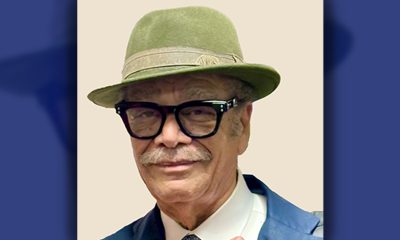
 Activism3 weeks ago
Activism3 weeks agoCOMMENTARY: DA Price Has Done Nothing Wrong; Oppose Her Recall
-
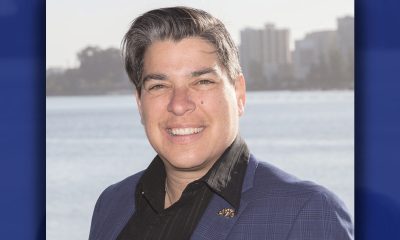
 Activism2 weeks ago
Activism2 weeks agoOP-ED: Hydrogen’s Promise a Path to Cleaner Air and Jobs for Oakland
-

 Activism3 weeks ago
Activism3 weeks agoBarbara Lee, Other Leaders, Urge Voters to Say ‘No’ to Recalls of D.A. Pamela Price, Mayor Sheng Thao
-
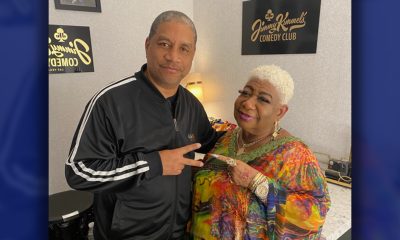
 Community2 weeks ago
Community2 weeks agoTerry T. Backs Oakland Comedy Residency by Oakland’s Luenell at Jimmy Kimmel’s Comedy Club in Las Vegas
-

 Activism3 weeks ago
Activism3 weeks agoOakland Post: Week of October 9 – 15, 2024
-

 Business2 weeks ago
Business2 weeks agoStudy Confirms California’s $20/Hour Fast Food Wage Raises Pay Without Job Losses
-

 Activism3 weeks ago
Activism3 weeks agoSurge of Support for Vote ‘No’ on Recall of Mayor Sheng Thao




